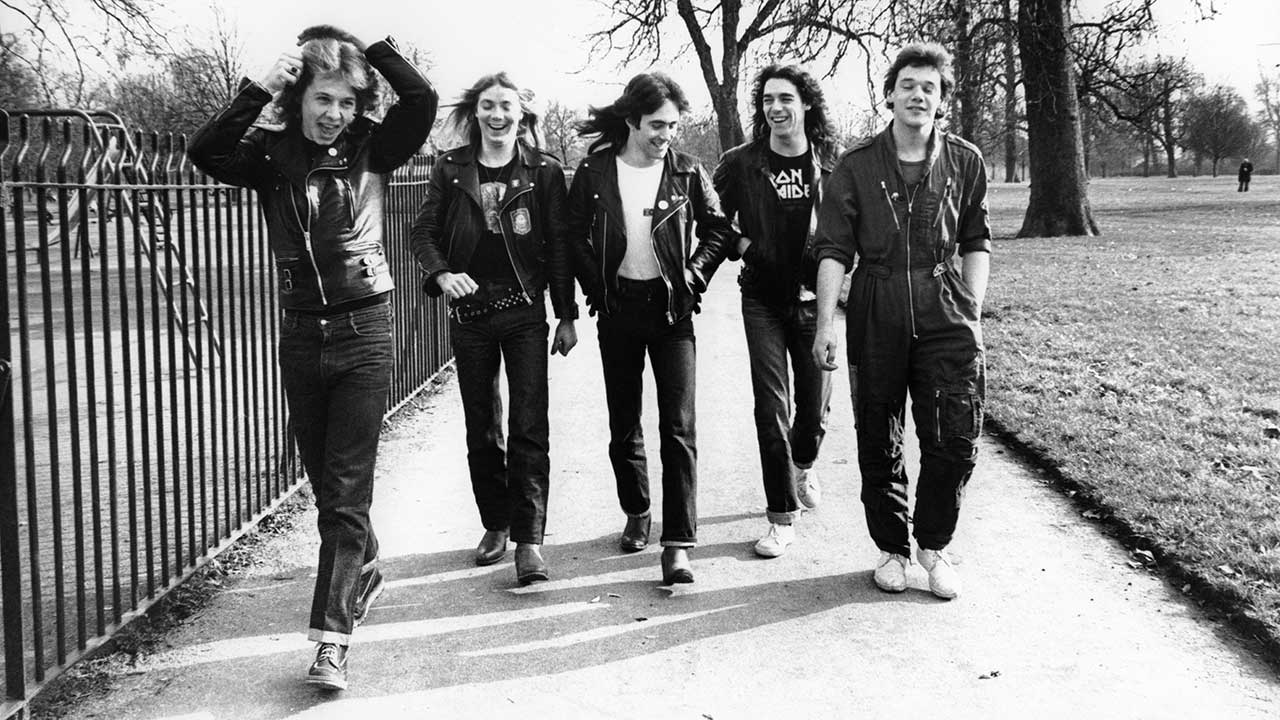Iron Maiden's self-titled debut album was an audacious release: bristling with energy, its songs were punk-rock raw yet progressive, brimming with ideas as well as power and passion. And Iron Maiden's finest moments – the thrilling Prowler, the towering Phantom Of The Opera, the chilling Remember Tomorrow, and the perennial, set-closing title track – are the equal of anything the band has released in the decades since.

Prowler
Steve Harris’s disdain for punk rock is well known, although the genre’s raw excitement is evident throughout Iron Maiden’s debut. Starting off with a fierce staccato riff, opening track Prowler is an effective introduction for what follows. Although the record’s DIY production is generally considered something of a handicap, it serves to enforce the notion that this was a band doing something a little bit differently to the rest.
The minute-long instrumental section that begins at 1.24 is quite extraordinary, hinting at a love of progressive rock that Harris would later own up to. And, for better or worse, the lyrics, which appear to celebrate a stalker – ‘Well, you see me crawling through the bushes with it open wide… Can’t you believe your eyes? It’s a beauty, girl’ – certainly don’t regurgitate any of the common heavy metal clichés.
Remember Tomorrow
Besides contributing those amazing vocals, in the band’s early days Paul Di’Anno was an important songwriting foil for Steve Harris. Written by both of them, Remember Tomorrow further proposes Iron Maiden’s willingness to think outside of the box. Di’Anno croons the first verse, the line: ‘I shall return from out of the fiii-rrr-eee!’ bleeding into a riff of quite monstrous proportions.
“Okay,” the listener thinks, “the soft part was merely an intro”, but before you know it Di’Anno is peacefully lamenting ‘Tears for remembrance, and tears for joy’, followed by the welcome return of that riff. When the track then accelerates up into to the stratosphere, only to glide gently back to earth for its lighter-waving conclusion, that listener is left slack-jawed.
Running Free
Another Harris/Di’Anno composition, Running Free is, as the singer suggests, “a rebellion song… It’s ‘fuck you, I won’t do what you tell me’. Powered by Clive Burr’s unusual drum beat, it was an anthem to youthful revolt that connected squarely with its intended audience: a 16-year-old who was ‘Out of money, out of luck’.
Phantom Of The Opera
The first of many songs written by Steve Harris that was inspired by historical and/or literary figures throughout the group’s catalogue, Phantom Of The Opera is the debut album’s epic piece, clocking in at more than seven minutes.
This homage to the 1910 novel by Gaston Leroux begins with an eerie, fleet-fingered guitar motif before taking off like a runaway locomotive, with Di’Anno throwing himself into the role of a being that has lived so long ‘in hiding behind that false mask’. If the song perhaps has a ‘bitty’ feel, the multi-tempo structure of Phantom is explained by the fact that Harris wrote it section by section before pulling everything together into one glorious patchwork whole.
Transylvania
Iron Maiden have released only a handful of tracks that don’t have vocals, and Transylvania wasn’t intended to be one of them. Harris later confided that when the band performed the song, “it sounded so good as an instrumental that we never bothered to write lyrics for it”.
Consequently it’s a track on which the musicians have the space to shine. The back-and-forth interplay between guitarists Dave Murray and Dennis Stratton is quite something to behold, and Clive Burr pounds his drums with a forceful yet unmistakable swing.
Strange World
Iron Maiden includes a lullaby? Well, that term might be stretching things a little, but the haunting loveliness of Strange World stands in stark contrast to the remainder of their ball-crushing debut album. ‘Living here you’ll never grow old,’ promises Di’Anno, in a voice that could charm the birds from the trees, while once again the guitars sing in their own distinctive, harmonious voices. Maiden’s soft spot is truly a thing of beauty.
Charlotte The Harlot
From the sublime to the ridiculous. Dave Murray writing credits on Maiden records are as rare as hen’s teeth, but when they do come along they’re always worth the wait.
Apparently based on a true story, Charlotte The Harlot tells the tale of an East End hooker who charged a fiver for starters, ‘And ten for the main course’. But rather than use the subject as mere titillation Murray’s twist was that Charlotte had taken so many men to her room, she felt no remorse: ‘You’ve got no feelings, they died long ago.’ Maiden would revive this tale on later albums.
Iron Maiden
The song that traditionally ends each Iron Maiden concert proper also brings to an end their opening full-length-album statement. Harris has written vastly superior tunes, yet the lines ‘Wherever you are, Iron Maiden’s gonna get you/No matter how far’, delivered more as a threat than a promise, have proved to be prophetic.

